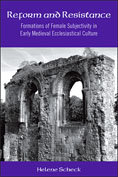
PhD, Binghamton University (SUNY)
About
Teaching and scholarly interests: Medieval and Early Modern literatures and cultures; Old English literature and language; early English drama; gender studies; performance and performativity; literacy and textuality; technologies of the book; women's intellectual culture.
Select Publications
Books
Reform and Resistance: Formations of Female Subjectivity in Early Medieval Ecclesiastical Culture

The fragmentary nature of early medieval ecclesiastical culture was masked by the growing trend towards centralization of secular and ecclesiastical power. Finding these moments to be most charged with conflict in relation to female subject possibilities, I focus on the dynamics of ecclesiastical reform and the resistance produced by such reform measures in order to examine what those tensions reveal about female autonomy. My inquiry, therefore, extends beyond one specific region or historical moment through two centuries and three diverse Germanic regions, all grappling with distinct stages of conversion and reform, different stages of cultural amalgamation out of which various possibilities for female subject formation emerge.
Intertexts: Studies in Anglo-Saxon Culture, Presented to Paul E. Szarmach, co-edited with Virginia Blanton. Medieval/Renaissance Texts and Studies, University of Arizona, 2008.
Rhetorics of Plague, Early and Late, co-edited with Richard Barney, special issue, The Journal for Early Modern Cultural Studies, 10.2 (Fall/Winter 2010).
Articles
“Nuns on Parade: Memorializing Women in Karolus Magnus et Leo Papa.” Reading Memory and Identity in the Texts of Medieval European Holy Women. Eds. Margaret Cotter-Lynch and Brad Herzog. Palgrave, New Middle Ages, 2012.
With Virginia Blanton. “Women.” A Handbook to Anglo-Saxon Studies. Eds. Jacqueline A. Stodnick and Renée R. Trilling. Wiley-Blackwell, Critical Theory Handbooks, 2012.
“At the Margins: Women, Texts, and Memory in Ottonian Saxony.” Nuns’ Literacies in Medieval Europe: The Hull Dialogue. Eds. Virginia Blanton, Veronica O’Mara, and Patricia Stoop. Brepols, 2012.
“Being and Abjection: Imago Dei in Hrotsvit’s Conversion of the Whore Thais.” Sexuality, Sociality and Cosmology. Eds. Jennifer Brown and Marla Segol. Forthcoming, Palgrave, New Middle Ages, 2012.
“Queen Mathilda of Saxony and the Founding of Quedlinburg: Women, Power, and Memory.” Historical Reflections/Réflexions Historiques 35.3 (Winter 2009): 21-36.
“Seductive Voices: Rethinking Female Subjectivities in The Wife's Lament and Wulf and Eadwacer.” Literature Compass 5.2 (February 2008), 220-27.
In the Works
Alcuin’s Correspondence with Women: A Translation with Introduction, Notes, and Commentary.
Charlemagne’s Sister: Women’s Intellectual Culture in Northern Europe, 800-1000. This project focuses specifically on women’s participation in the typically male-dominated sphere of intellectual culture in the Carolingian and Ottonian dynasties.
Recent Presentations
“Considering the Source: Hrotsvit von Gandersheim and Christopher St. John.” Hrotsvit 2014: Pageants and Pioneers. University of Hull, England. May 31, 2014.
“Recognizing Women’s Cultural Production during the Anglo-Saxon Benedictine Reform: Manuscripts, Mobility, and Memes.” 49th International Congress on Medieval Studies. Western Michigan University. May 2014.
Panelist, New Readings on Women in Old English Literature: A Roundtable Discussion. 49th International Congress on Medieval Studies. Western Michigan University. May 2014.
“Valenciennes bibliothèque municipale 81: Women’s Learning at the Intersection of Frankish, Anglo-Saxon, and Irish Scholarship.” International Society of Anglo-Saxonists. Dublin, July 29-August 2, 2013.
“Aristotle at Gandersheim.” Third and final symposium on Nuns’ Literacies in the Middle Ages. Antwerp, Belgium. June 2013.
With Virginia Blanton, “Leoba and the Iconography of Learning in the Lives of Anglo-Saxon Women Religious II.” Third and final symposium on Nuns’ Literacies in the Middle Ages. Universiteit Antwerp, Belgium. June 2013.
“Unsettling Categories: Hrotsvit’s Revision of the Drusiana Legend through a Latin Epitome of Aristotle’s Categories.” 48th International Congress on Medieval Studies. Western Michigan University. May 2013.


